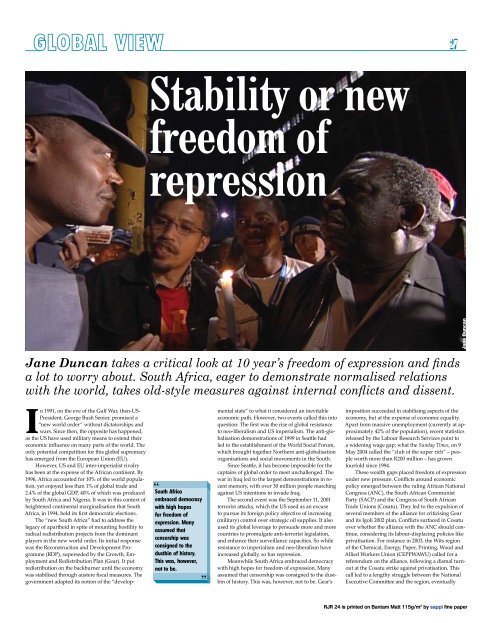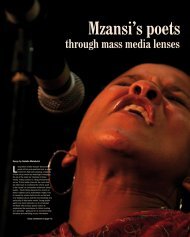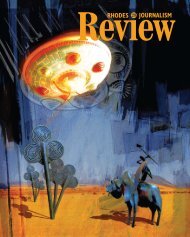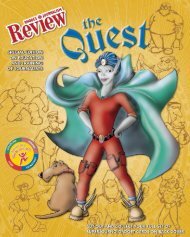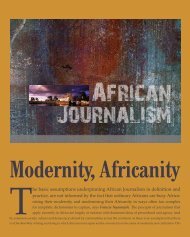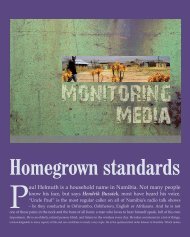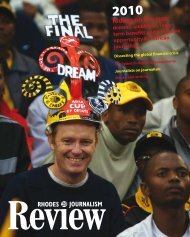FULL PDF - Rhodes Journalism Review - Rhodes University
FULL PDF - Rhodes Journalism Review - Rhodes University
FULL PDF - Rhodes Journalism Review - Rhodes University
You also want an ePaper? Increase the reach of your titles
YUMPU automatically turns print PDFs into web optimized ePapers that Google loves.
In 1991, on the eve of the Gulf War, then-US-<br />
President, George Bush Senior, promised a<br />
“new world order” without dictatorships and<br />
wars. Since then, the opposite has happened,<br />
as the US have used military means to extend their<br />
economic influence on many parts of the world. The<br />
only potential competition for this global supremacy<br />
has emerged from the European Union (EU).<br />
However, US and EU inter-imperialist rivalry<br />
has been at the expense of the African continent. By<br />
1996, Africa accounted for 10% of the world population,<br />
yet enjoyed less than 1% of global trade and<br />
2.4% of the global GDP, 40% of which was produced<br />
by South Africa and Nigeria. It was in this context of<br />
heightened continental marginalisation that South<br />
Africa, in 1994, held its first democratic elections.<br />
The “new South Africa” had to address the<br />
legacy of apartheid in spite of mounting hostility to<br />
radical redistribution projects from the dominant<br />
players in the new world order. Its initial response<br />
was the Reconstruction and Development Programme<br />
(RDP), superseded by the Growth, Employment<br />
and Redistribution Plan (Gear). It put<br />
redistribution on the backburner until the economy<br />
was stabilised through austere fiscal measures. The<br />
government adapted its notion of the “develop-<br />
Stability or new<br />
freedom of<br />
repression<br />
Jane Duncan takes a critical look at 10 year’s freedom of expression and finds<br />
a lot to worry about. South Africa, eager to demonstrate normalised relations<br />
with the world, takes old-style measures against internal conflicts and dissent.<br />
south africa<br />
embraced democracy<br />
with high hopes<br />
for freedom of<br />
expression. many<br />
assumed that<br />
censorship was<br />
consigned to the<br />
dustbin of history.<br />
This was, however,<br />
not to be.<br />
mental state” to what it considered an inevitable<br />
economic path. However, two events called this into<br />
question: The first was the rise of global resistance<br />
to neo-liberalism and US imperialism. The anti-globalisation<br />
demonstrations of 1999 in Seattle had<br />
led to the establishment of the World Social Forum,<br />
which brought together Northern anti-globalisation<br />
organisations and social movements in the South.<br />
Since Seattle, it has become impossible for the<br />
captains of global order to meet unchallenged. The<br />
war in Iraq led to the largest demonstrations in recent<br />
memory, with over 30 million people marching<br />
against US intentions to invade Iraq.<br />
The second event was the September 11, 2001<br />
terrorist attacks, which the US used as an excuse<br />
to pursue its foreign policy objective of increasing<br />
(military) control over strategic oil supplies. It also<br />
used its global leverage to persuade more and more<br />
countries to promulgate anti-terrorist legislation,<br />
and enhance their surveillance capacities. So while<br />
resistance to imperialism and neo-liberalism have<br />
increased globally, so has repression.<br />
Meanwhile South Africa embraced democracy<br />
with high hopes for freedom of expression. Many<br />
assumed that censorship was consigned to the dustbin<br />
of history. This was, however, not to be. Gear’s<br />
RJR 24 is printed on Bantam Matt 115g/m 2 by sappi fine paper<br />
2<br />
Jane Duncan<br />
imposition succeeded in stabilising aspects of the<br />
economy, but at the expense of economic equality.<br />
Apart from massive unemployment (currently at approximately<br />
42% of the population), recent statistics<br />
released by the Labour Research Services point to<br />
a widening wage gap; what the Sunday Times, on 9<br />
May 2004 called the “club of the super rich” – people<br />
worth more than R200 million – has grown<br />
fourfold since 1994.<br />
These wealth gaps placed freedom of expression<br />
under new pressure. Conflicts around economic<br />
policy emerged between the ruling African National<br />
Congress (ANC), the South African Communist<br />
Party (SACP) and the Congress of South African<br />
Trade Unions (Cosatu). They led to the expulsion of<br />
several members of the alliance for criticising Gear<br />
and its Igoli 2002 plan. Conflicts surfaced in Cosatu<br />
over whether the alliance with the ANC should continue,<br />
considering its labour-displacing policies like<br />
privatisation. For instance in 2003, the Wits region<br />
of the Chemical, Energy, Paper, Printing, Wood and<br />
Allied Workers Union (CEPPWAWU) called for a<br />
referendum on the alliance, following a dismal turnout<br />
at the Cosatu strike against privatisation. This<br />
call led to a lengthy struggle between the National<br />
Executive Committee and the region, eventually


